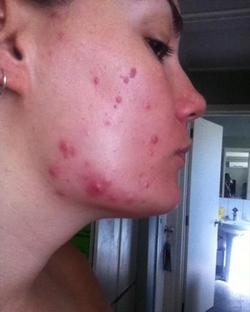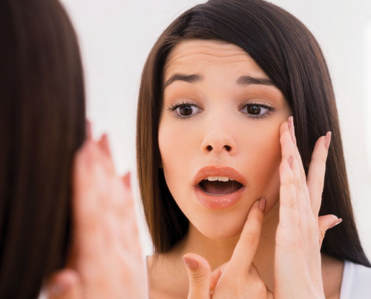Pure Indulgence Beauty Therapy
acne. While there are many factors that can contribute to breakouts, whether in adolescence or as an adult, there are many ways to treat acne at all ages. There are numerous possible causes for adult acne and the cause varies from person to person. The fluctuation of hormones can trigger outbreaks very easily. In women, monthly breakouts can be attributed to menstruation, but can become worse as the hormones change during menopause. Pregnancy affects women's hormones in many ways, so acne can be a major issue during this time. Stress is also a major contributor to adult acne. During heavy times of stress, the body produces more androgens, which stimulate oil glands and hair follicles in the skin, which, in turn, can cause acne. Constant and consistent stress can lead to problematic skin. Family history can also cause adult acne or acne in general. Skin and hair products can contribute to breakouts more so than people think. Looking carefully at labels can help prevent this type of acne. The obvious terms skin care professionals need to educate clients to look for are "non-comedogenic," "non-acnegenic," "oil-free," and "won't clog pores." Certain medications can also have side effects that can cause acne. If so, clients should discuss alternatives with their physician. If a client thinks a medication is causing a breakout, he or she should consult a doctor before discontinuing the medication. Another major cause of adult acne is digestive acne. What people ingest can often affect whether or not a breakout will occur. Diets high in trans, or "bad", fats and highly processed foods do not fuel the body in a healthy way. An imbalanced diet can cause an imbalance within the body. This disparity can cause many different issues, but with the skin being the body's largest organ, it is often where the body reacts, thus signaling something deeper. While there are many ways to treat adult acne, finding the treatment that best suits the client will be done on a case-by-case basis. When dealing with hormones, skin care professionals need consider what may be going on in the client's body and how they can control it. Whether it be a monthly occurrence or pregnancy, they will need to analyze what will work best for the client's specific situation. Having the client consult their doctor is the best way to determine how to control the acne if hormones are the cause. Balancing stress is a major factor. People grow and change as adults, but finding the perfect flow is the challenge in itself. A balanced life means a balanced mind, which translates to a healthy body and skin to match. Digestive acne can be tricky to pinpoint, but wheat, soy, gluten, and dairy can be common triggers for adult acne. Having a healthy diet will ensure clear skin, as well as a healthy body. Taking note of a breakout and what may have been consumed around that time can be an indication to food sensitivity. Professionals have many treatments in their arsenal to help with adult acne such as customized deep pore facials, chemical peels, charcoal masks, and blue light therapy. Having clients visit their dermatologist to discuss advanced technology to treat more severe breakouts allows clients to explore different options. It is not ideal for anyone to wake up with a pimple staring at them in the mirror, but gaining knowledge and finding the right treatment will get their skin back on track and glowing like they deserve! Thanks to Dermascope for the insperation for this post  There’s no doubt about it, the number of compromised, problematic skins we are seeing is on the increase. Our clients’ lifestyle, diet, work/home environments and stress levels are damaging many skins, making skin disorders more common than ever before. The secret is that tackling problem skins begins from the inside. The skin is created, supported and nourished from within so if it is showing signs of dysfunction, you need to look to the internal cause not just treat the symptoms topically. Cystic acne is an example of a condition created entirely from within and therefore only able to be healed from the inside. Absolutely nothing can be done topically to treat this distressing condition. These photos demonstrate the dramatic results you can achieve with cystic acne if you address the cause not just the symptoms. So what sort of internal factors can be contributing to your skin's problem? Firstly, nutritional deficiencies play a major part and unfortunately, if your dry skin or acne is the result of a lack of certain vitamins or minerals, you will not be able to address this without first correcting the deficit. No amount of topical application of skin care products alone will be able to heal the problem. A good example of that is acne. Studies have shown that acne sufferers are much more likely than non-acne sufferers to be deficient in the following vitamins and minerals:
So it is easy to see why we are doomed to failure if we do not address these nutritional deficiencies. Unfortunately it is becoming more and more likely you will be suffering from a lack of one or more of the important skin nutrients. Some key skin nutrients, like beta-carotene and vitamin C, can easily be obtained through the diet by increasing your client’s intake of fresh fruit and vegetables. Other nutrients like zinc, B complex and EFA’s (Essential Fatty Acids) are best supplemented to ensure there is an adequate intake for healing skin. There are also many things in our modern diets that can contribute to the problems our clients’ experience. Being aware of these problem foods can go a long way to helping correct the issues. Some of these problem foods are obvious like alcohol. You just need observe what happens to someone with fine, fair, sensitive skin who drinks alcohol to know that it is one of the most inflammatory things they can do and it definitely makes skin redder. There are lots of other ‘hidden’ foods that could be ‘stoking the fire’ and contributing to the problems you may be experiencing. Heating and congesting foods and drinks become an issue for those of our clients who are genetically sensitive to them. On the positive side, more and more of our commonly eaten foods are managing to find their way onto the growing list of foods that contain phyto-chemicals that heal and rebalance the skin. It is also important to take a holistic view of the skin. What other influencing factors could be contributing to the problem? Examples of irritants are chlorinated pools, hot spa pools, air conditioning, certain chemicals, soaps and shampoos to name just a few. Rosacea is an example of a condition that is greatly affected by external factors and these need to be considered in the treatment of this disorder. In the Beauty Industry it has become common for us to look at the skin as an isolated part of the body rather than considering the big picture. The best way it was ever explained to me, is the skin is the best refection of your internal health. This is so true of skin conditions as they are seldom due to only one factor. For example, the development of dermatitis can be a combination of a skin weakened by nutritional deficiencies being exposed to irritating chemicals and fuelled by inflammatory foods. We also need to consider all the factors that could be undermining the health of the skin. The work/home environment, exercise, sleep, stress, diet, product application, overheating, and the list goes on. Thanks to Janine Tait, for the inspiration for this post. |
Categories
All
Archives
September 2019
|
Opening Hours:Monday: Closed
Tuesday: 10am - 7pm Wednesday: 10am - 5pm Thursday: 10am - 8pm Friday: 10am - 5pm Saturday: 10am - 2.30pm Sunday: Closed |
Text:Address:168 Kendal Ave
Burnside Christchurch |
Email: |
Pure Indulgence Beauty Therapy operates by appointment only.
,Since 2010 Pure Indulgence has been emphasising self love and care and building a community of like minded people. We pride ourelves on our educated and professional therapists, whilst also ensuring your experience is relaxing. We are an advanced skin, IPL and beauty clinic situated in Burnside, Christchurch. We comibine relaxation with luxurious skincare and modern technology to bring you treatments that work.
©2023 Pure Indulgence Beauty Therapy Nz Ltd. All Rights Reserved

